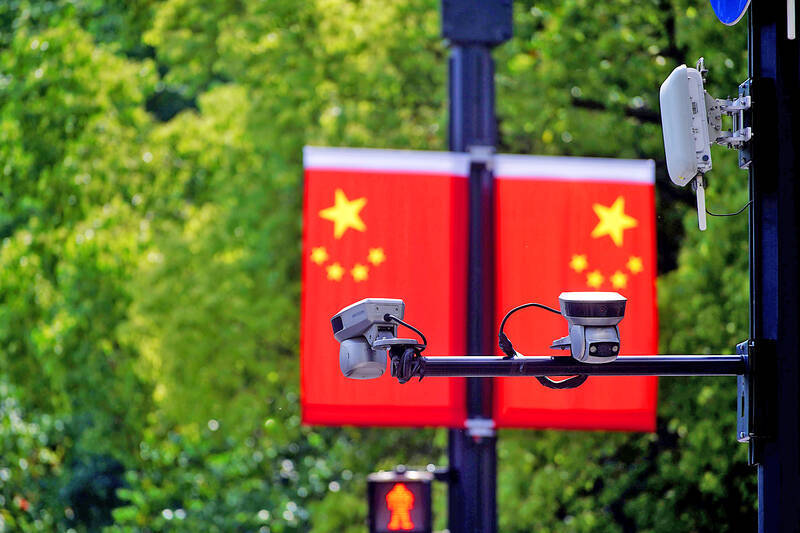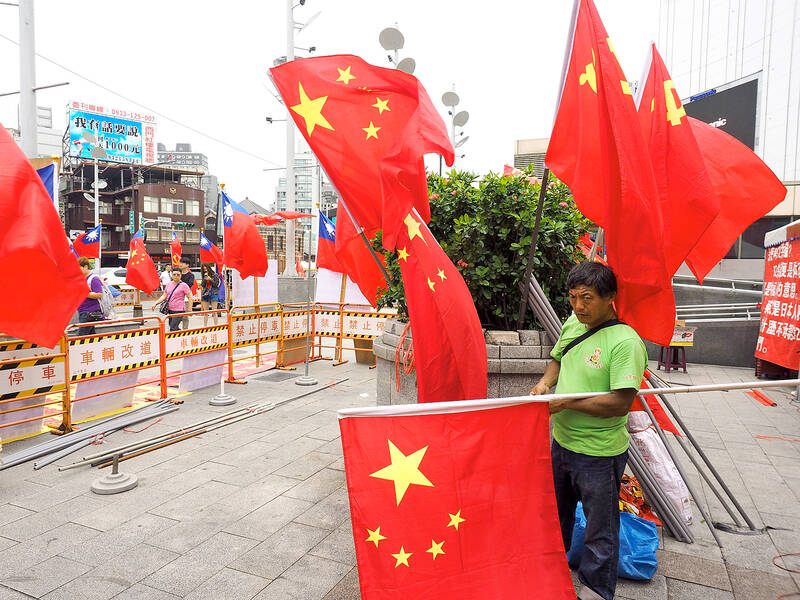People should avoid unnecessary travel to China after Beijing issued 22 guidelines allowing its courts to try in absentia and sentence to death “Taiwan independence separatists,” the Mainland Affairs Council (MAC) said yesterday as it raised its travel alert for China, including Hong Kong and Macau, to “orange.”
The guidelines published last week “severely threaten the personal safety of Taiwanese traveling to China, Hong Kong and Macau,” MAC Deputy Minister and spokesman Liang Wen-chieh (梁文傑) told a news conference in Taipei.
“Following a comprehensive assessment, the government considers it necessary to elevate the travel alert to orange from yellow,” Liang said.

Photo: Reuters
Beijing has implemented or amended national security laws for mainland China, and enforced new national security laws in Hong Kong and Macau, he said.
“We have been urging Beijing to avoid creating barriers that would impede cross-strait exchanges. Unfortunately, Beijing continues to implement measures that damage cross-strait relations and has been doing so with intensifying efforts,” he said. “The guidelines it issued on June 21 would only increase the personal safety risks of Taiwanese traveling in China.”
If a trip is necessary, people should avoid discussing sensitive political issues; taking pictures of seaports, airports and military facilities; and carrying books on politics, history or religion while there, Liang said.

Photo: David Chang, EPA-EFE
The council on its Web site has a list of behaviors that could potentially cause Taiwanese to contravene national security laws while they are in China, Hong Kong or Macau, he said, adding that they should read them and register their travel plans with the council before departing.
The Ministry of Transportation and Communications in a statement said that it respects the council’s decision.
“Our position that cross-strait tourism exchanges should proceed in a healthy, progressive and orderly manner remains unchanged,” the ministry said.
The travel alert is a recommendation to travel agencies and the public, who can decide for themselves whether they should proceed, the ministry said.
Tour cancelations should be handled based on standardized contracts between travel agencies and their customers, the ministry said, adding that disputes could be arbitrated by the Travel Quality Assurance Association.
As some tours were formed before the government reintroduced a group tour ban for China, Minister of Transportation and Communications Li Meng-yen (李孟諺) asked the Tourism Administration to closely monitor the status of tour groups in China, and remind people to assess the risks and beware of their safety, the ministry said.
The travel alert to China was “red” during the COVID-19 pandemic and was downgraded to “yellow” in October 2022 when the pandemic eased, Liang said.
The government was planning to further downgrade the alert to “gray” in July last year, but maintained the “yellow” alert after Beijing proposed an amendment to an anti-espionage law and implemented a new National Security Law in Hong Kong.
“The government has an obligation to remind people that there are indeed risks traveling to China following the announcement of guidelines to punish ‘separatists,’” Liang said. “We cannot ignore the situation and pretend as if nothing happened, or we would be accused of being negligent.”
The travel advisory is neither a mandatory rule nor a retaliatory measure against Beijing’s anti-separatist guidelines, he said.
The US in July last year elevated its travel alert to China and Macau to Level 3 after Beijing implemented amendments to its Foreign Relations Law and Anti-Espionage Law.
In April, the US travel alert was extended to cover Hong Kong, Liang said.
The Level 3 alert says that people should reconsider travel to China, Hong Kong and Macau “due to arbitrary enforcement of local laws” and “risks of local detention.”
Concern for the safety of Taiwanese traveling in China is not unfounded, Liang said.
Gusa Press (八旗文化) editor-in-chief Li Yanhe (李延賀), better known by his pen name, Fucha (富察), is under investigation for alleged infringement of the “Anti-Secession” Law, as is Taiwanese National Party cofounder Yang Chih-yuan (楊智淵), Liang said.
“It is possible that none of them would imagine they would be arrested and detained for breaching the ‘Anti-Secession’ Law,” he said. “The point is that they were arrested because of what they did outside of China, not what they did in China.”
The council has also received reports about retired Taiwanese police and military personnel being interrogated and detained upon arrival, he said.
China has extradition agreements with about 60 countries, with most of them stating that no political prisoners would be extradited, Liang said, adding that extradition would only occur if a person is found guilty in both countries.
“We think none of the developed countries would extradite Taiwanese to be tried in China, but some countries might still comply with their agreements with China,” he said.

INVESTIGATION: The case is the latest instance of a DPP figure being implicated in an espionage network accused of allegedly leaking information to Chinese intelligence Democratic Progressive Party (DPP) member Ho Jen-chieh (何仁傑) was detained and held incommunicado yesterday on suspicion of spying for China during his tenure as assistant to then-minister of foreign affairs Joseph Wu (吳釗燮). The Taipei District Prosecutors’ Office said Ho was implicated during its investigation into alleged spying activities by former Presidential Office consultant Wu Shang-yu (吳尚雨). Prosecutors said there is reason to believe Ho breached the National Security Act (國家安全法) by leaking classified Ministry of Foreign Affairs information to Chinese intelligence. Following interrogation, prosecutors petitioned the Taipei District Court to detain Ho, citing concerns over potential collusion or tampering of evidence. The

‘FORM OF PROTEST’: The German Institute Taipei said it was ‘shocked’ to see Nazi symbolism used in connection with political aims as it condemned the incident Sung Chien-liang (宋建樑), who led efforts to recall Democratic Progressive Party (DPP) Legislator Lee Kun-cheng (李坤城), was released on bail of NT$80,000 yesterday amid an outcry over a Nazi armband he wore to questioning the night before. Sung arrived at the New Taipei City District Prosecutors’ Office for questioning in a recall petition forgery case on Tuesday night wearing a red armband bearing a swastika, carrying a copy of Adolf Hitler’s Mein Kampf and giving a Nazi salute. Sung left the building at 1:15am without the armband and apparently covering the book with a coat. This is a serious international scandal and Chinese

Seventy percent of middle and elementary schools now conduct English classes entirely in English, the Ministry of Education said, as it encourages schools nationwide to adopt this practice Minister of Education (MOE) Cheng Ying-yao (鄭英耀) is scheduled to present a report on the government’s bilingual education policy to the Legislative Yuan’s Education and Culture Committee today. The report would outline strategies aimed at expanding access to education, reducing regional disparities and improving talent cultivation. Implementation of bilingual education policies has varied across local governments, occasionally drawing public criticism. For example, some schools have required teachers of non-English subjects to pass English proficiency

TRADE: The premier pledged safeguards on ‘Made in Taiwan’ labeling, anti-dumping measures and stricter export controls to strengthen its position in trade talks Products labeled “made in Taiwan” must be genuinely made in Taiwan, Premier Cho Jung-tai (卓榮泰) said yesterday, vowing to enforce strict safeguards against “origin laundering” and initiate anti-dumping investigations to prevent China dumping its products in Taiwan. Cho made the remarks in a discussion session with representatives from industries in Kaohsiung. In response to the US government’s recent announcement of “reciprocal” tariffs on its trading partners, President William Lai (賴清德) and Cho last week began a series of consultations with industry leaders nationwide to gather feedback and address concerns. Taiwanese and US officials held a videoconference on Friday evening to discuss the